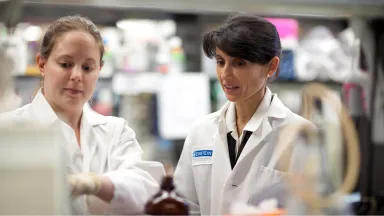
Bogos Agianian, Ph.D.
- Research Assistant Professor, Department of Biochemistry
Area of research
- Structural biology, drug discovery, molecular biophysics, structure-function, kinases, cancer
Location
- Albert Einstein College of Medicine Jack and Pearl Resnick Campus 1300 Morris Park Avenue Bronx, NY 10461
Research Profiles
Professional Interests
My research is centered on harnessing the power of small molecules to modulate protein structure and function. We are interested in creating tool compounds to understand key biological processes as well as leads with therapeutic value. Our targets include key drivers in cancer and other diseases and proteins involved in cell death and survival. Recently, we also work on Covid-19 therapeutics. Our methods follow a combinatorial approach, integrating X-ray crystallography, computational drug design and a battery of biochemical, cellular and biophysical techniques.
Novel BRAF targeting
Oncogenic mutations at position V600 of BRAF are found in almost 50% of melanoma tumors, while a number of non-V600 mutations are driving other cancers. BRAFV600 mutant usually acts as an active monomer, however, constitutive or induced BRAF dimers mediate intrinsic and acquired resistance to current RAF-targeted clinical treatments.
Considering the key clinical importance of BRAF dimerization in tumors, we initiated a systematic quest for novel small molecule inhibitors that recognize BRAF dimers. Our BRAF-inhibitor co-crystal structures and rational drug design efforts produced PHI1, a new inhibitor that targets BRAF at an unprecedented allosteric pocket and displays specificity for BRAF dimers over monomers. In combination with clinical drugs, PHI1 demonstrates enhanced inhibition in resistant melanoma and non-V600 BRAF dependent lung cancers.
Currently, we vigorously optimize the potency and specificity of PHI-class inhibitors in biochemical, biophysical and cellular experiments and work toward obtaining clinical leads with desirable pharmacological targeting of resistant tumors in vivo.
SARS-CoV-2
The COVID-19 pandemic represents a major global health emergency, with immense economic and social significance. There are currently no effective therapeutics to stop the spread of the virus.
Based on our expertise in chemical and structural biology, medicinal chemistry and drug discovery, we have initiated a collaborative effort to develop effective small molecule inhibitors of the main protease (Mpro or 3CL) of SARS-CoV-2, an essential enzyme for viral replication. We will investigate repurposing of FDA-approved drugs or preclinical compounds and develop novel lead inhibitors. Importantly, we will validate the cellular activity of such inhibitors in CDC-compliant viral replication and infectivity assays.
This research is supported by Einstein and the generosity of philanthropists.
In the News
Overcoming Melanoma Drug Resistance

Therapeutics Development: Development of Small Molecule Inhibitors

Selected Publications
Cotto-Rios X.M.C.#, Agianian B.#*, Gitego N., Zacharioudakis E., Giricz O., Wu Y., Zou Y., Verma A., Poulikakos P.I., Gavathiotis E.* Inhibitors of BRAF dimers using an allosteric site. Nature Communications, 2020, 11:4370
Agianian B*, Gavathiotis E*. Current Insights of BRAF Inhibitors in Cancer. J. Med. Chem. 2018, 61, 5775-5793.





